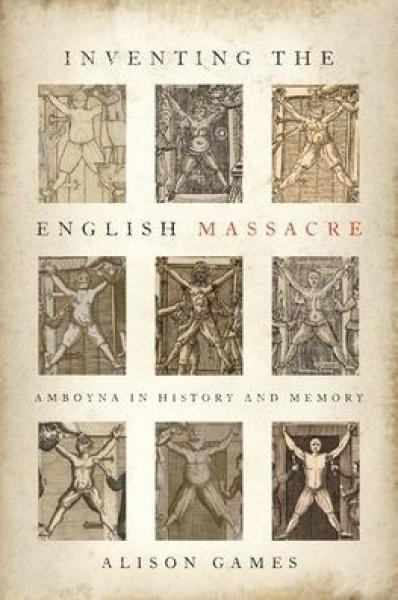Description
Inventing the English Massacre shows how the English East India Company transformed that conspiracy into a massacre through printed works, both books and images, which ensured the story's tenacity over four centuries. By the eighteenth century, the story emerged as a familiar and shared cultural touchstone and a term that needed no further explanation. By the nineteenth century, the Amboyna Massacre became the linchpin of the British empire, an event that historians argued well into the twentieth century had changed the course of history and explained why the British had a stronghold in India. The broad familiarity with the incident and the Amboyna Massacre's position as an early and formative violent event turned the episode into the first English massacre.
Drawing on archival documents in Dutch, French, and English, Alison Games masterfully recovers the history, ramifications, and afterlives of this event, which shaped the meaning of subsequent acts of violence and made intimacy, treachery, and cruelty indelibly connected with massacres.
"This book explains how a conspiracy trial featuring English, Japanese, and Indo-Portuguese co-conspirators who allegedly plotted against the Dutch East India Company in the Indian Ocean in 1623 produced a diplomatic crisis in Europe and became known for four centuries in British culture as the Amboyna Massacre. The story of the transformation of this conspiracy into a massacre is a story of Anglo-Dutch relations in the seventeenth century and of a new word in the English language, massacre. The English East India Company drew on this new word to craft an enduring story of cruelty, violence, and ingratitude. Printed works--both pamphlets and images--were central to the East India Company's creation of the massacre and to the story's tenacity over four centuries as the texts and images were reproduced during conflicts with the Dutch and internal political disputes in England. By the eighteenth century, the story emerged as a familiar and shared cultural touchstone. By the nineteenth century, the Amboyna Massacre became the linchpin of the British Empire, an event that historians argued well into the twentieth century had changed the course of history and explained why the British had a stronghold in India. The broad familiarity with the incident and the Amboyna Massacre's position as an early and formative violent event turned the episode into the first English massacre. It shaped the meaning of subsequent acts of violence, and placed intimacy, treachery, and cruelty at the center of massacres in ways that endure to the present day."--
In vivid prose, Alison Games has unpacked an event on the Indonesian island of Ambon known as a 'massacre' in the British historical imagination. Filled with memorable characters, her book is both a necessary reminder of why this center of the international clove trade mattered so much in the early seventeenth century and also a meditation on historical meaning and memory. Games compels us to think anew about how our act of telling and retelling stories reveals as much about the historian as about the past. -- Peter C. Mancall, author of The Trials of Thomas Morton:: An Anglican Lawyer, His Puritan Foes, and the Battle for a New England
Masterfully researched, rigorously argued, and utterly riveting, Inventing the English Massacre reveals the power a single word can have over our perception of both the past and present, suggesting that sometimes the most powerful part of a whodunnit is not in fact the crime itself but its many afterlives. Deliberately and brilliantly never resolving what actually happened at Amboyna in 1623 (or was it 1622 or 1624?), Games sleuths out a far greater mystery: the invention of the idea of the first English colonial 'massacre, ' one which shaped not only Anglo-Dutch relations across the seventeenth century but the stories the British Empire would tell about itself for generations to follow. -- Philip Stern, author of The Company-State: Corporate Sovereignty and the Early Modern Foundations of the British Empire in India
Alison Games brings her considerable talents not only to the complex and confused events in seventeenth-century Indonesia but also to the long conversation that these events spawned. She masterfully reveals how a judicial murder (the result of an alleged conspiracy) became a symbol of Dutch perfidy, making the case that the discourse around Amboyna shaped the British conceptualization of its empire. This smart book is beautifully written, conveying a nuanced understanding of an elusive but fascinating history. A story that seems at first glance to be striking but minor becomes in Games's deft hands a rumination on violence, self-image, history, and memory. Brava to the author for this tour de force of global, imperial and British history. -- Carla Pestana, UCLA
Inventing the English Massacre confirms Alison Games's place as an indispensible and extraordinarily versatile chronicler of the early modern English empire. Elegantly conceived and meticulously researched, the book offers an entirely fresh perspective on a long misunderstood episode in imperial history. By investigating not only what happened in 1623 in Ambon, when English and Dutch spice traders bloodily collided, but what later generations thought had happened, Games brilliantly connects the intrigue, violence, and sheer confusion of European competition in seventeenth-century southeast Asia to the myth-making of British imperialists well into the twentieth. -- Maya Jasanoff, Harvard University
Product Details
- Oxford University Press, Brand
- May 1, 2020 Pub Date:
- 0197507735 ISBN-10:
- 9780197507735 ISBN-13:
- 324 Pages
- 9.4 in * 6.4 in * 1.1 in Dimensions:
- 1 lb Weight:




